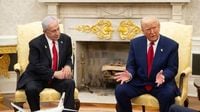On October 9, 2025, the world witnessed a historic turn in the long and bloody saga between Israel and Hamas. As autumn rain briefly fell on Tel Aviv’s Hostages Square, families and supporters gathered with a cautious sense of hope—the kind that had eluded them for two years since Hamas’s devastating invasion of southern Israel. The announcement of a Gaza peace deal, just ahead of the Simchat Torah holiday and the second anniversary of the attacks, marked a potential end to a conflict that had claimed more than 67,000 Palestinian lives and left Israeli society reeling with anguish and uncertainty, according to The Times of Israel.
This peace agreement, if it holds, promises the return of 20 living Israeli hostages and the bodies of 28 dead captives. The deal’s timing is poignant, falling on the Hebrew calendar’s anniversary of the attacks, and the mood in Israel is one of tentative optimism. As The Times of Israel put it, “Despite the clouds hanging gray and low over Israel’s coast, the mood was anything but dark.” For many, the rain felt like a cleansing—washing away, if only briefly, the pain and anger of a brutal war.
Behind the scenes, the road to this deal was anything but straightforward. Negotiations to finalize the Gaza agreement took place in Egypt, with U.S. representatives Steve Witkoff and Jared Kushner at the table, joined by mediators from Qatar, Egypt, and Turkey, as reported by Axios. The “phase one” deal was built on a 20-point peace plan unveiled by President Donald Trump the previous week. Under its terms, Hamas agreed to release the remaining Israeli hostages, while Israel committed to withdrawing troops from parts of Gaza and observing a ceasefire. In exchange, roughly 2,000 Palestinian prisoners would be released, and a phased Israeli withdrawal from Gaza would begin, according to Newsweek.
The agreement goes further. The second phase proposes the replacement of Hamas with an independent Palestinian governing body, the establishment of a multinational Palestinian-Arab security force, and funding for Gaza’s reconstruction from Arab and Islamic nations—with only limited participation from the Palestinian Authority. If the deal survives, it could be remembered as one of Israel’s most comprehensive victories, strengthening deterrence and restoring confidence after its most deadly debacle in recent memory, The Times of Israel noted.
President Trump, never one to shy away from the spotlight, was quick to tout the agreement as his latest diplomatic triumph. During a Cabinet meeting at the White House, Trump declared, “Nobody in history has solved eight wars in a period of nine months. And I’ve stopped eight wars. That’s never happened before.” He added, “I did it to save lives.” Yet, he also made it clear he wouldn’t mind a Nobel Peace Prize for his efforts, stating back in February, “I deserve it, but they would never give it to me,” as reported by Axios.
Trump’s claims of peacemaking extend well beyond Gaza. In the past nine months, he’s credited himself with brokering or ending conflicts between Armenia and Azerbaijan, the Democratic Republic of Congo and Rwanda, Israel and Iran, India and Pakistan, Cambodia and Thailand, as well as earlier efforts in his first term involving Egypt and Ethiopia over the Grand Ethiopian Renaissance Dam and the Washington Agreement between Serbia and Kosovo. Some of these, as AP and Axios have pointed out, involved simmering disputes more than active wars, and in several cases, fighting resumed or tensions remained high despite signed agreements.
The Gaza deal itself was shaped by a complicated regional context. Just months prior, in June 2025, the U.S. and Israel launched strikes on three key Iranian nuclear sites, followed by a ceasefire two days later. Trump has argued that these attacks were necessary to prevent Iran from acquiring nuclear weapons, saying, “Let’s say that didn’t happen, they’d probably, by now, have a nuclear weapon, numerous nuclear weapons, and therefore, even if we signed a deal, there’d be a big dark cloud over it, and it wouldn’t be the same thing,” according to Newsweek.
In a surprising twist, Trump announced that Iran had expressed willingness to participate in wider Middle East peace talks following its support for the Gaza ceasefire plan. “Iran wants to work on peace now, they’ve informed us,” Trump said. “They’ve acknowledged that they are totally in favor of this deal. They think it’s a great thing, so we appreciate that, and we’ll work with Iran.” Iran’s Foreign Ministry, for its part, stated, “The Islamic Republic of Iran has always supported any initiative that entails ending the genocidal war, the withdrawal of occupying forces, the entry of humanitarian aid, the release of Palestinian prisoners and the realization of the fundamental rights of the Palestinian people.” However, Iran’s foreign minister made it clear that Tehran would not relinquish its “right to enrich uranium,” emphasizing, “There is NO solution but a negotiated outcome.”
Trump’s broader strategy links the Gaza ceasefire to his approach on Iran’s nuclear ambitions and the reconstruction of Gaza. He expressed hope that resolving the nuclear impasse could open the door for Iran’s support in rebuilding Gaza, but he insisted, “They can’t have a nuclear weapon.” Trump planned to travel to Egypt the weekend after the deal’s announcement to discuss the next stages of his peace initiative with regional leaders.
The political response in the United States has been as complex as the deal itself. Most Democrats, while welcoming the prospect of peace and the return of hostages, have been reluctant to credit Trump personally. Senator Bernie Sanders was blunt, saying, “I don’t want to give credit right now. We have given, as a nation, billions and billions of dollars under Biden and under Trump to starve children in Gaza. I’m not talking about credit.” Other Democratic leaders, such as Senator Mark Warner and Representative Hakeem Jeffries, issued statements praising the progress but conspicuously avoided mentioning Trump’s role.
Yet, some Democrats have acknowledged the administration’s efforts, if not the president himself. Governor Josh Shapiro of Pennsylvania said, “The work that his administration has done here has been really important. There’s a lot that still needs to be worked out, but we’re moving in the right direction.” Senator John Fetterman went further, congratulating Trump directly and calling the plan “historic.” Still, the political calculus remains fraught, with many Democrats wary of appearing to endorse a president whose other policies they deeply oppose.
For ordinary Israelis, the announcement brought a rare moment of relief. As families of hostages allowed themselves to smile for the first time in years, the hope is that this peace deal will hold—and that, finally, the region may see the beginnings of a lasting calm. Whether this agreement will be remembered as a genuine turning point or just another pause in a cycle of violence remains to be seen. But for now, there is a glimmer of hope amid the storm clouds.


